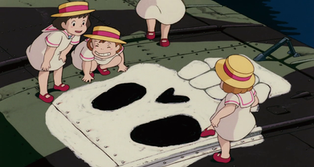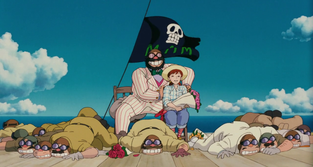Porco Rosso (1992)
- nickkarner
- Jan 25, 2022
- 11 min read

What makes a hero? So often in movies, we’re presented with a dashing figure of charm and sophistication who woos the ladies and antagonizes the jealous male onlookers. Conversely, we also get dirty, musclebound bad boys with good hearts who want nothing to do with society, but when duty calls, guess who’s going to be there to save that bus full of school children? Physical beauty is in the eye of the beholder and everyone’s taste differs; sometimes on a personal level and sometimes based on an approval of the masses. In Hayao Miyazaki’s stirring redemption tale Porco Rosso (1992), the protagonist has been cursed to resemble a humanoid pig. He walks, he talks, he flies a plane, it’s just that he looks...like a pig. It immediately makes him an object of fascination. He’s very much a reluctant hero, like his more conventionally handsome counterparts, but his physical attributes raise an important question about what it means to be a man. To put a finer point on it, what does it mean to be a good man?

What exactly is a “minor” work when it comes to the output of world-class filmmakers? Are Bringing out the Dead and After Hours less important compared to the towering achievements of Scorsese’s Goodfellas or Raging Bull? Sure, Dirty Harry spawned a huge franchise and became a cultural phenomenon, but what about Don Siegel’s Charley Verrick? Even Steven Spielberg, whose films were often regarded as event pictures based off of his involvement alone, made The Terminal, a smallish film that isn’t ranked among his greatest achievements, but is by no means a bad film. It’s just...not as grand. As a huge fan of Miyazaki, I can’t help but feel protective of him, especially since his incredible output has essentially made it necessary for him to amaze us every time out. Luckily, it doesn’t seem to have bothered the man himself, since a film like Ponyo doesn’t strive to be as grandiose as Spirited Away. Although one could argue that Nausicaa and Castle in the Sky were larger in scale than Kiki’s Delivery Service and certainly My Neighbor Totoro, Princess Mononoke and later Spirited Away and Howl’s Moving Castle definitely indicated Miyazaki’s willingness to swing for the fences.

Porco Rosso is a curious piece. It’s much more adult than many of his other films, not in terms of frightening imagery, but literally in the dialogue. Sex is discussed. The only truly fantastical element is Porco’s transformation into a pig, which we never see occur. Otherwise, the movie is barely populated by many young people whatsoever. It’s mostly pirates and flight enthusiasts.

Still, Miyazaki can draw some cute kids, so when 15 school children are kidnapped along with several sacks of gold, somebody has to fly to the rescue. How many swashes must be buckled before a scoundrel becomes a lovable rogue? Han Solo may be the definition of a roguish hero in that he wasn’t averse to a crime or three to get what he wanted. We first meet the eponymous Porco while snoozing on the beach of his small hideaway, a Cinema magazine covering his face while a half-bottle of wine and a half-eaten apple sit next to a radio. A frantic call comes in. The ruthless but surprisingly paternal Mamma Aiuto gang has snatched up the kiddies and gold and the piggish bounty hunter is the only one who can save them. He revs up his Savoia S.21 fighter plane and away we go!
The Crimson Pig, as he’s sometimes known, soars through the air, where he’s greeted by various cheering onlookers. Although he keeps to himself, there’s clearly a Porco Rosso fan club. The kidnapped girls are having the time of their lives, playing with the various bullets and guns while making comments about Porco to the pirates: “You keep missing him. I think he’s better than you.” Rosso takes them down easily and signals in Morse code via flashlight to release the girls, hand over the booty, and walk away. The pirates are steamed but warily comply. He reprimands them for their silly tactics: “Show some ambition! You’re a pirate!”
He arrives for dinner at The Hotel Adriano, which is run by chanteuse/owner Gina, whose husband flew with Porco before the mysterious curse fell upon him. Apparently, Porco was once a fighter pilot named Marco Rossolini who fought for Italy in World War I. A band of pirates, looking like a scarred-up troupe of mafiosos, scowl at the sunglasses-wearing pig as he enters the dining room. One of them looks suspiciously like Hitler. Gina’s singing catches the eye of a taller, much more handsome member of the pirates’ party, Donald Curtis. The debonair Hollywood wannabe actor is a world-famous American daredevil pilot who’s desperate to take the talented Gina along with him to La La Land. She’s already had three pilot husbands and isn’t interested in the cocky Curtis’ advances. Porco respects Curtis but finds him dull, prompting the competitive Yank to join the pirates in their bid to take Porco out of commission. The film has a wonderfully irreverent tone, balancing nonsense with reality, like when a ship carrying several passengers receives a calm announcement that pirates are attacking and to not be alarmed.
With his S.21 malfunctioning, he stops off to re-up on ammunition before jetting off to Milan for repairs from a Mr. Piccolo, the only aviation mechanic he trusts. The kindly weapons dealer remarks that there’s trouble brewing in the government and bounty hunting may soon be outlawed, cutting off Porco’s only means of supporting himself. In one of the many mature and socially-charged statements made in the film, the dealer says to his son, “If you can make money from war, you’re scum. If you can’t make money from bounty hunting, you’re an idiot.”
Many elements from Castle in the Sky make their way into Porco Rosso, especially the director’s customary wide shot of the giant sky framing a single flying plane. Curtis finds Porco just as his plane begins to sputter. Opening fire, Rosso’s plane gets shot down. Miyazaki’s animation is always beautiful, but sometimes his own cinematic prowess is overlooked. Instead of simply showing Curtis touch down to retrieve a piece of Rosso’s plane as proof of the pig’s demise, the plane is obscured by a small island in the foreground for the duration of its landing. It’s a clever and unexpected shot.
Everyone believes Porco to be dead, which is how he likes it considering the Italian government has a warrant out for his arrest. He phones Gina before heading over to Mr. Piccolo’s shop. The mechanic is brilliant, but not cheap. As he piles stacks of cash on Piccolo’s desk, Porco meets Fio, Piccolo’s very young granddaughter. As is standard operating procedure for Miyazaki films, the female protagonists are strong and resilient. Fio is no exception. The adult theme of sexism is quite prevalent here as Porco deems her too inexperienced to personally repair his beloved S.21. It’s one of a kind and has a unique design that only a very skilled pilot can handle and only a superior mechanic can repair. In other words, man's work.
Fio stays up all night, working on the re-design of Porco’s plane. Although skeptical, they share a fascinating repartee about the mechanics of aeronautic design and he can tell she knows what she’s doing, although the fact that she’s both young and a woman irks him. The building crew arrives, consisting entirely of the female members of Piccolo’s family. They’re loud, hardworking, and very Italian. The construction scenes are fabulous, allowing us to see the nuts and bolts of how a plane would have been built in the 1930’s. We get our first taste of a literal spirituality when the group sits down to (what else?) a pasta lunch, and Piccolo asks God to “forgive us for building a fighter plane with the hands of women.” Miyazaki tends to reference spirits rather than outright religion, but with Porco Rosso existing in a world with real-life historical events, it makes sense that he’d go with a more straightforward, and therefore understandable view of religion because of these particular characters.
Porco takes in a movie with a silly flying pig, which he finds greatly offensive. His old war buddy, Ferrari, now a member of the Italian government, warns Porco that he should leave town immediately. He even offers to find a way for Porco to work with the Italians, but Porco finds the direction the government is headed aggravating, claiming he’d “rather be a pig than a fascist.”

We get exciting dual sequences, first with Fio picking Porco up from the movies only to be chased by the fascist secret police. Porco is highly amused when Fio suggests that he could be a spy. She forces her way onto his first flight in the newly-constructed plane, which is tricky since they don’t even know whether it will fly. The secret police attempt to catch them and the plane skims the surface of the canal, sending giant waves of water onto the Italian pavement. Porco is very concerned about Fio being regarded as his accomplice, but she’s a smart cookie. She identifies herself as his hostage, so that should work out nicely for her and not so nice for him if he were to be brought down.
In quick succession, we find Donald trying to woo Gina to Hollywood, Ferrari signals Porco that he’s headed into a trap by the government, and speaking of the big guys in charge, bounty hunting has been outlawed, so Porco’s out of a job. Fio and Porco arrive at his private beach, where she’s so excited she goes for a celebratory swim. Out of nowhere, the pirates ambush Porco, threatening to slice him into bacon. In another callback to Castle, the pirates are immediately smitten with the courageous and tough Fio, who reminds them that fighter pilots are men of honor. It’s a real party as the Clark Gable/Errol Flynn clone Curtis arrives, zeroes in on Fio, and proposes marriage. Men will be men, and a bet is made. Porco and Curtis will battle in the air, with money or Fio’s hand at stake.
In the dead of night, Porco examines the rusted bullets he’ll be using by lantern light. Fio wakes up and sees Porco as a human for a brief moment. He suggests a story to put her back to sleep. We finally discover the truth behind “the curse.” Admittedly, except for a man who looks like a pig, the film has been set in the real world. However, I was expecting there to be some sort of witch or maybe a hex on Porco’s bloodline that caused his malady. Instead, we discover an otherworldly moment of transcendence as Marco and his team, including Gina’s deceased husband, encounter enemy bi-planes during the war. In an aerial dogfight that lasts for hours, Marco begins to lose consciousness while flying into a cloud cover, his compatriots long since having been downed by Austro-Hungarian fire. Miyazaki’s description of the numbness Marco feels is quite stunning and feels very much like a real experience. The plane takes on a life of its own as he floats above the cloud cover. There, he sees a long bond of white snaking across the sky. Both the enemy and the team’s aircraft slowly rise around him. He calls out for his friends, but receives no answer. In a breathtaking reveal, we realize the bond of white are thousands of planes. Marco realizes that although it is not his time to leave this literal “Earthly plane,” his callous and womanizing ways are punished by God through his transformation into what his heart represents: a pig. Pigs figure prominently in Spirited Away, being a representation of sloth and greed as well as being animated in a frightening and twisted fashion. Miyazaki often refuses to conform to traditional storytelling, preferring to work in ambiguities, but Marco's, now Porco’s, plight seems indicative of a redemption tale.
The big day of the battle arrives. The crowd is raucous, with the pirates taking bets and employing grenades just to calm the onlookers down. The “bets” are placed on a platform, with the gang boss acting like a real gentleman with Fio, then gruffly telling Curtis, holding the comically large sack of money complete with a dollar sign, to “set it down, moron!” Fio has faith in Porco, but because of the film’s unpredictability, one does truly wonder what will happen in the skies above. The boss, by the way, is decked out in a fancy pinstriped suit. “I’m trying to be classy, ya idiot!”
Curtis may be skilled, but thanks to Fio’s brilliant design and Porco’s flying prowess, he proves to be no match. And yet, Porco refuses to fire on him. Gina discovers that the Italians have learned of the fight and are headed for the island to arrest Porco. In an amusing moment, after both of their guns jam, Porco and Curtis begin lobbing equipment at each other as they fly side by side.

The men must not be having a “bully day” since they take their fight to the ground with a good ol’ bare knuckle brawl. They beat the hell out of each other. There’s no blood, but the damage inflicted is pretty explicit, with bruises and large lumps on their faces. They accuse each other of being womanizers, which they basically are...then both knock each other down. Gina arrives and...like in the conclusion of Rocky II, Porco staggers to his feet and is declared the winner. Curtis accepts defeat, the pirates head to the hotel for drinks, and Fio is handed over to Gina, who is coming to terms with her feelings for Porco. Ever the loner, he begins to leave, but Fio gently kisses him beforehand. Curtis, before he dejectedly heads off for the bright lights of Hollywood, indicates that Porco’s appearance has changed.
We get a brief epilogue where Curtis does indeed become a dashing leading man. Fio becomes president of her grandfather’s company. And Gina, who had a longstanding bet inside her garden about someone joining her there, may or may not have ended up with Porco. Like in Spirited Away and even Totoro, Miyazaki won’t directly answer this question, lending a faux frustrating air of playfulness. There’s a strong indication that Porco does indeed end up with Gina, but his plane may just be docked at her hotel, like always.
I’m all for a long movie, but I admit that I’m glad Miyazaki kept Porco Rosso lean and mean. His love of both planes and the sea allow him to indulge in the most aerodynamic film he ever made, until The Wind Rises. His films are magical, but some can feel a bit heavy-handed. Porco, on the other hand, flows like the wind through a propeller; rough, yet impossibly smooth. His approach to alternate-history is intriguingly anachronistic, although it wasn’t the first time that he merged fantasy and realism. His own anti-war feelings, particularly due to the Yugoslav Wars beginning around the time of production, do cause the film to be more serious in tone than was previously planned, although this is still a film for the whole family, despite a few adult themes and language here and there. Since Miyazaki’s reputation as an artist is so absolute, it’s always heartening to see him have some fun, like with an engine embossed with the words “Ghibli.”

As always, Joe Hisaishi provides the amazing score, which feels like a character unto itself. Both romantic and bouncy, the score feels different than his others. More robust. Since I’ve been re-watching these films with my daughter, I feel the need to watch only the dubbed versions rather than having to narrate any subtitles which could be too quick or complicated for her to read. Also, honestly, that sounds exhausting. Although some fans of the original dubs may scoff, I do find the Disney versions to be quite good. No matter what, the dialogue really does look like it’s coming out of their mouths, and as someone who has had to deal with audio drift while editing films, I can appreciate that. It allows me to enjoy the story and animation rather than be distracted.
The great Susan Egan returns to voice another strong-willed heroine, lending her considerable skills to Gina. Ditto David Ogden Stiers, who voices his Kamaji lookalike, Mr. Piccolo, as a protective and business-minded mechanic who won’t forget to send the bill. Brad Garrett’s real-life large frame and deep voice works comedic wonders as the gang boss of the Mamma Aiuto gang. Kimberly Williams-Paisley is spunky as Fio, and the legendary Frank Welker, Kevin Michael Richardson, and Spongebob’s best friend Patrick himself, Bill Fagerbakke fill out the rest of the gang. The finest work here belongs to our protagonist and antagonist, respectively. Cary Elwes was born in the wrong time period. The heir apparent to Errol Flynn, the Princess Bride and Robin Hood: Men in Tights actor remains the go-to for any production that needs a grandstanding rascal who won’t give up easily. Comeback kid Michael Keaton brings a brilliant level of gravitas and world-weariness to his vocalization of Porco. His work here is quietly powerful.

One critic regarded Porco Rosso as the most underrated of the Ghibli output. I’d tend to agree. Sandwiched between his lighter fare like Kiki’s Delivery Service and the dark themes of Princess Mononoke, Porco Rosso sometimes gets lost in the shuffle because of its unique qualities. But, to put it simply: Is it possible for Miyazaki to make a bad film? Pshaw! When pigs fly!


























































































